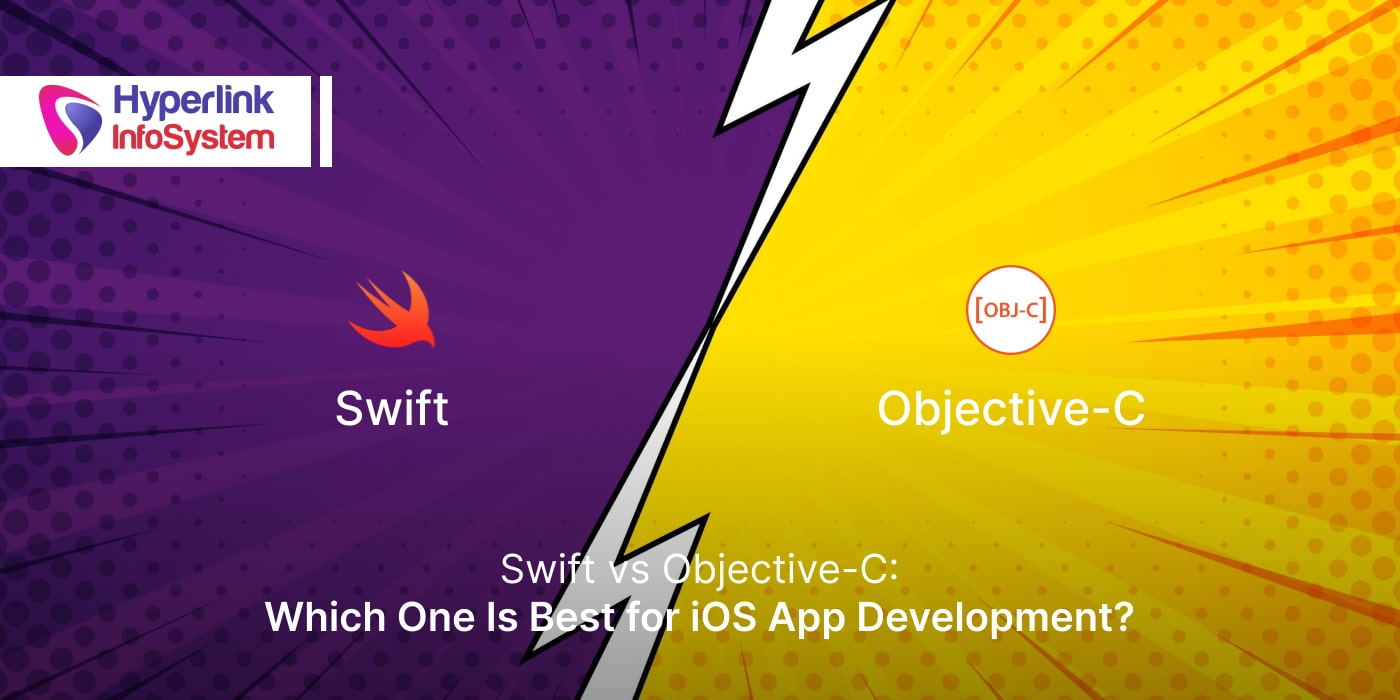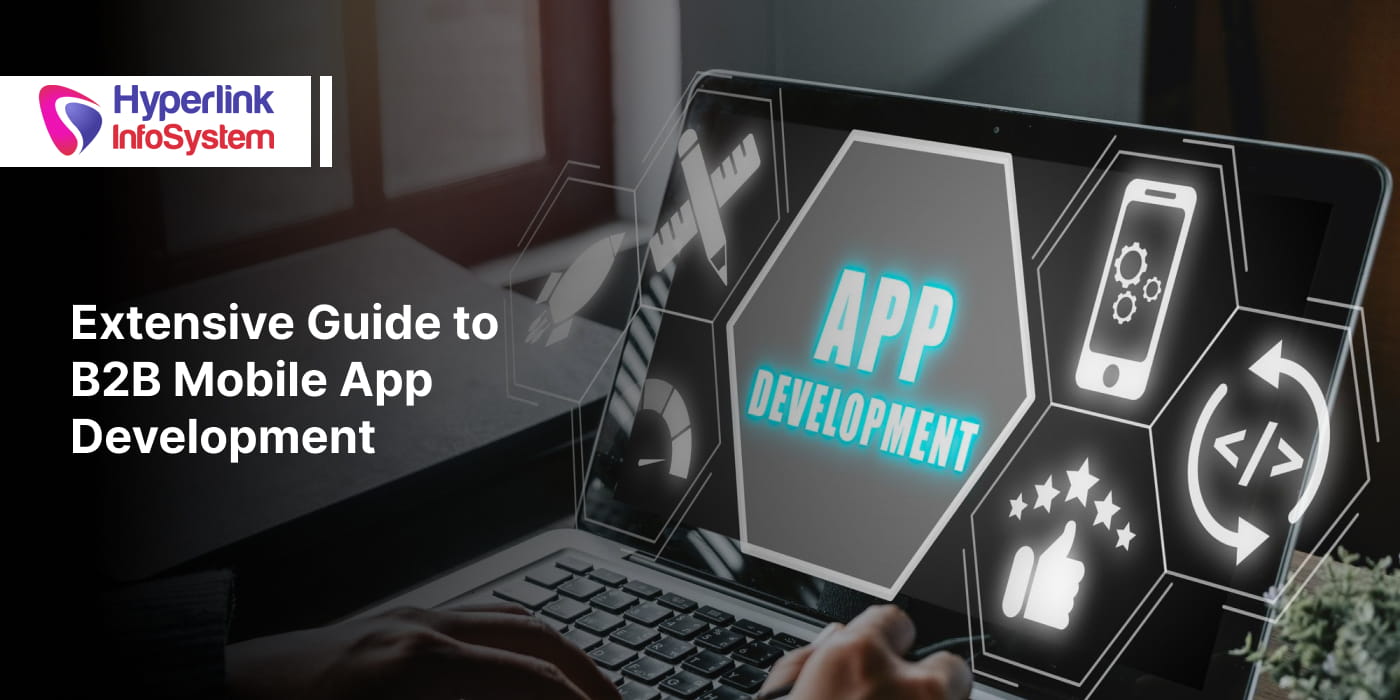Difference Between Swift and Objective-C
Jul 2024

Whenever it comes to choosing the best programming languages for apps, especially for iOS, most iPhone app development companies are fumbling. The right tech stack yields a drastic impact on the performance, efficiency, and scalability of your project. As we step into 2024, the long-lost debate about the difference between Objective-C and Swift continues to be an obstacle for developers and global enterprises alike. iOS app developers already pose the challenge and argument between Kotlin vs Java, or even deciding on a modern programming language for the latest projects.
Whether you hire iPhone app developers from reputed iPhone app development companies or not, the decision to curate user-friendly experiences within Apple’s ecosystem remains an appalling one. Objective-C vs. Swift: both languages have their peculiar benefits and features. To make a smarter decision, understand what goes into iOS development and compare the pros and cons first before analyzing the difference between Objective-C and Swift. Begin by defining your project needs, developer's expertise, and project roadmap for developing an iOS app. This blog dives into the strengths and weaknesses of both languages to help you make a smart decision.
What Is Swift?
Swift is a robust and modern programming language curated by Apple for macOS, watchOS, iOS, and TVOS app development. Since its inception way back in 2014, Swift has been devised to be a swift, secure, and expressive solution, which makes it a top choice among developers for building a native iOS app. Being relatively new in the market, its popularity rose due to its simplified syntax, automatic memory management, and contemporary features. This efficiently robust modern programming language has become a reliable option for developers and eradicates Objective-C as the first go-to choice for iOS app development.
Swift, with its crisp and concise syntax, becomes easy to access for those accustomed to different modern programming languages like Python or Java. Its innovative features like type and optional inference help in having fewer bugs and crashes compared to other programs. Swift is also easily compatible with Linux.
Pros of Swift Programming Language
Let's check out some of the advantages of Swift and whether it's suitable for iOS app development or not:
- Readability
Swift has a clear syntax, which makes it easy to understand, write, and maintain codes, fostering smart collaboration and quick development.
- Security
Swift is inclusive of in-built features such as Automatic Reference Counting (ARC) and type safety, which help reduce errors and avoid leaks in memory, which leads to protected and stable applications.
- Modern Features and Syntax
Swift comfortably welcomes modern programming concepts such as streamlining development, concise coding, functional programming, generics, and closures. Since Swift boasts an expressive and clean syntax, it diminishes boilerplate code and makes it easier to read and write.
- Interoperability
When building a native iOS app, Swift comfortably works alongside Objective-C, which helps developers integrate the legacy code into the latest projects without any previous code rewriting.
- Active Development and Community Support
Both Apple and iPhone app development companies actively support Swift via frequent updates, and enhancements while confirming its long-term viability. In addition to this, Swift has a rapidly growing community, hence keeping development on its toes, or, as we call it, Swift.
- Safety and Speed
Since Swift's code compilation power is much quicker in comparison to Objective-C, it completely eradicates complete classes of code that are unsafe. This language facilitates safe programming patterns and introduces contemporary features to make it easy, fun, and flexible.
- Performance
Swift is curated for iPhone app development companies to provide optimal performance. It leverages high-performing LLVM compiler technology, that further translates the code into an optimized language in machines that's unleashes it's actual potential.
Cons of Swift Programming Language
- Young Language
Swift may be becoming a popular language pretty quickly compared to other popular programming languages, but it is still relatively new in comparison to Objective-C. Hence, it could lead to a lower level of maturity when it comes to third-party libraries and tools.
- Recurring Updates
Swift goes through a very frequent and periodic update, which occasionally causes a bunch of issues in compatibility and needs developers to quickly adopt to these newer changes, hence, tampering with the learning curve.
What Is Objective-C?
Curated way back in the 1980s, Objective-C is a generic purpose, object-oriented programming language. It was the primary language when it came to macOS development and iOS app development, way before Swift. Being a superset of C, the level of authority and efficiency it holds is what makes it a top choice among other programming languages such as JavaScript or Python. Objective-C builds on object-oriented ideas and incorporates Smalltalk-style messaging into the C programming language, making the framework not only versatile but also ideal for constructing organized sophisticated programs.
Pros of Objective-C Programming Language
- Stable and Mature Ecosystem
Since Objective-C has been around for over four decades now, it's a very mature and stable modern programming language and is loved by iOS app developers. Boasting a vast array of libraries and frameworks accumulated in the last 40 years, this language offers a solid development foundation.
- Compatible with Legacy Code
Objective-C can seamlessly integrate with all pre-existing codebases from previous projects. This feature helps in extending, maintaining, and continuing development with older apps and eliminates the need for extensive rewrites.
- Dynamic Runtime
Objective-C offers a dynamic runtime that helps coding become more flexible, like, for instance, dynamically loading classes or runtime methodologies that can prove influential in specific scenarios.
- Performance
Objective-C is greatly optimizable, definitively yielding benefits in performance for specific scenarios.
- Huge Developer's Pool
Several seasoned programmers are familiar with Objective-C, thereby making it more straightforward to identify candidates for your next endeavor.
Cons of Objective-C Programming Language
- Complicated Syntax
Objective-C's syntax is a little more complex, verbose, and negligibly intuitive in comparison to Swift, hence ushering in a steeper learning curve for developers who're starting in the field.
- Modern Feature Scarcity
Objective-C is a restricted arena when it comes to developing an iOS app. Its lack of definitive modern language features that are readily available in Swift, creates extra errors and crashes, making the code slightly succinct and maintainable.
- Diminishing Demand
Apple, Objective-C developers, and even the leading iPhone app development companies are biased towards Swift, hence, Objective-C will experience a lot fewer updates and resources in the long run.
- Manual Memory Management
Objective-C developers and even iOS app developers have to manage all internal memory in a manual manner, which could lead to errors and crashes if not addressed cautiously.
Difference Between Objective-C and Swift
Let's break down, and understand the major difference between Objective-C and Swift and why programming languages such as JavaScript or Python fall short in front of them:
- Interoperability
When it comes to Objective-C vs. Swift, both these modern programming languages can interoperate seamlessly. Still, Swift integrates much more conveniently with Objective-C, empowering developers to leverage both in the same project.
- Performance
Swift's speed is enhanced by a sophisticated compiler, but Objective-C's dynamic runtime could result in performance overhead.
- Syntax and Readability
Swift boasts of a syntax that is both modern and concise, which makes it convenient for reading and writing in comparison to Objective-C's verbose and intricate syntax.
- Safety
Swift prioritizes robustness with elements such as optionals and error handling, significantly reducing the risk of runtime accidents. Objective-C, although versatile, doesn't require the identical amount of safety inspections.
| Feature | Objective-C | Swift |
|---|---|---|
| Syntax | More verbose, requires more punctuation | Clean, readable, concise |
| Safety | Manual memory management, prone to errors | Type safety, ARC minimizes errors |
| Speed | Potentially faster in specific scenarios | Generally faster compilation and execution |
| Modern Features | Limited modern features | Embraces modern programming concepts |
| Learning Curve | Steeper learning curve | Easier to learn and maintain |
| Developer Pool | Larger pool of experienced Objective-C developers | Growing pool of Swift developers |
| Legacy Code | Seamless integration with existing codebases | Limited legacy code integration |
| Future Support | Decreasing support and updates | Actively developed and supported by Apple |
Swift Vs. Objective-C: Which One to Choose for iOS App Development?
Among the best programming languages for apps and estimating the difference between Objective-C and Swift, the choice still depends on a plethora of factors such as project requirements, expertise of your development team, and forthcoming maintenance deliberations. Here's a better overview to understand when to choose what language for its unique purpose:
When to Choose Swift?
- Modern Projects
If you're thinking of building apps from scratch for your iPhone app development, Swift is the way to go. Top Swift frameworks in comparison to Kotlin vs Java boast incredible modern features, long-term Apple support, safety benefits, and optimal performance.
- Enhanced Readability and Maintenance
Swift's simple and succinct syntax improves code readability and maintenance, which is extremely beneficial for enhancing developer productivity, long-term upkeep, and collaborative projects. Swift's clean syntax helps the iPhone app development company save a bundle of time and effort for the future.
- Future-Proofing
When it comes to developing an iOS app, even iOS app developers believe that Swift is the future of iOS development. With strong backing from Apple and a continuously growing community, it adapts effectively to other evolving technologies. Choosing Swift gives you project relevance, support, and continued development by Apple.
When to Choose Objective-C?
- Sustaining Legacy Codebases
If you have a previously developed app development project that already contains a significant amount of Objective-C code, it's sensible to choose Objective-C to avoid shortfalls in timings and the associated code rewriting costs of Swift. This also maintains the overall efficiency.
- Utilizing Dynamic Runtime
For iOS applications that need Objective-C's dynamic runtime capabilities, such as method swizzling or dynamic method resolution, Objective-C can serve as the more effective option.
- Mature Libraries and Frameworks
Objective-C has existed since the 1980s, and its wealth of mature libraries and frameworks, won't be equivalent to top Swift frameworks. If your project of building a native iOS app heavily relies on these, sticking to Objective-C is more beneficial.
- Performance-Critical Apps
In rare circumstances when maximum efficiency is critical, Objective-C could offer diminutive enhancements.
Conclusion
The difference between Objective-C and Swift comes with its own set of advantages and disadvantages. Swift is ideally the new age modern choice, rendering security, performance, and a lively developer community, making it perfect for developing an iOS app from scratch and future-proofing it. While Objective-C possesses dynamic capabilities and a robust ecosystem that is powerful in retaining old code and harnessing specialized runtime abilities. Although the final decision will completely depend on your individual project requirements, development team's expertise, and long term goals for your iOS app. Understanding the pros and cons, along with side by side differences, will help you make a more educated decision.
To minimize complications or setbacks, considerable investigation should be conducted before hiring. Before you begin your ideal iOS application development project, make sure you have the right team that can provide a reasonable price for your solution without sacrificing quality. Some key considerations before outsourcing your project to an iOS app development business are their track record, competence, team capacity, and past customer feedback. To summarize, it is impossible to determine the precise cost of app development since numerous elements must be considered before calculation. You can also connect with a top iPhone app development company like Hyperlink InfoSystem to sort out your iPhone app development without going through the pain of hiring iPhone app developers. Drop us an email to connect with us today.
Frequently Asked Questions
As per the statement produced by Apple itself, Swift is around 2.6 times quicker than Objective C. Although, it's important to note that the predicted speed is frequently proportional to the speed in which coding happens. Since Swift has a much more lean and straightforward syntax than Objective-C, the developer's focus is reshifted onto the essence of the code rather than its underpinning rules.
Yes, Swift and Objective-C can conveniently interoperate with each other, which allows both Objective-C developers and Swift developers to utilize both popular programming languages on the same project.
Swift is ideally the best programming language for iOS development. It is easier to learn for beginners due to having a clean and modern syntax with robust features for safety. Swift is also ideal when it comes to long-term maintenance and offers amazing readability, holds active community support, and immaculate safety features.
Latest Blogs

Is BlockChain Technology Worth The H ...
Unfolds The Revolutionary & Versatility Of Blockchain Technology ...


IoT Technology - A Future In Making ...
Everything You Need To Know About IoT Technology ...

Feel Free to Contact Us!
We would be happy to hear from you, please fill in the form below or mail us your requirements on info@hyperlinkinfosystem.com
Hyperlink InfoSystem Bring Transformation For Global Businesses
Starting from listening to your business problems to delivering accurate solutions; we make sure to follow industry-specific standards and combine them with our technical knowledge, development expertise, and extensive research.
4500+
Apps Developed
1200+
Developers
2200+
Websites Designed
140+
Games Developed
120+
AI & IoT Solutions
2700+
Happy Clients
120+
Salesforce Solutions

40+
Data Science

















